Galatea (ˌɡæləˈtiːə / gal-a-TEA-a)
Goddess of battle and strength, the greatest god of war in the Empyreal pantheon, patron deity of the amazons
O tender mother of battle! Look upon your desperate children! Take us in your loving embrace!Galatea is the Goddess of Battle and Strength, mightiest of the three Empyreal war gods. She is the indiscriminating patron of all warriors that shows her favor to anyone that demonstrates her virtues in battle -- a dualistic deity worshipped by barbarians and military professionals alike. Hers are the domains of bloodshed, brutality, and ferocity but also of combat prowess, mastery of weapons, and martial proficiency.
Religious knowledge
The gods of war of the Empyreal Faith are known as the Bloody Triumvirate: Galatea is the Goddess of Battle, his brother Aegir the God of Valor, and their father Maelach the God of Warfare. Maelach is the supreme Lord of War, the patron of generals and leaders, while his children embody the virtues of the soldier: Galatea represents unconquerable power and mastery of arms while Aegir is the dauntless spirit of bravery and self-sacrifice that drives warriors to legendary deeds. Of these three mighty gods, Galatea is arguably the most widely worshipped due to the universal applicability of her domains to the needs and wants of every warrior. Although Galatea is not one of the eldest deities amongst the Empyreals, she is one of the most powerful -- and definitely the most violent. Empyreal mythology describes her as an undefeatable warrior that has slain many a godly opponent in battle. While her father Maelach is the principal god of war, she is widely considered to be his superior in terms of divine power. This belief arises not only from mythology but also from the overwhelming popularity of Galatea as an object of worship: the Empyreal Faith accepts it as fact that the more a god is worshipped the stronger that god becomes.Worship
Galatea is worshipped all across the world and even in the wide cosmos beyond, and so the practices of her followers are extremely varied. She grants her followers blessings of strength and ferocity as reward for deeds of battle, bloodshed, and bravery. All manner of cultures worship her. Her paladins and clerics can be found amidst barbarians, mercenaries, soldiers, and adventurers. The worship of any god of war is traditionally a bloody affair and the recent centuries of peace in the Heartlands have seen the Bloody Triumvirate dwindle in popularity. Even so Galatea remains the most popular of the three deities for her domain of strength neet not be associated with battle at all -- and even battle can be conducted with non-lethal consequences. In these modern times Galatea is worshipped relatively peacefully by brawlers, athletes, gladiators, and performance duelists -- as is her brother Aegir, the God of Glory. Their father Maelach, however, holds dominion over war and war alone; he is the God of the Greatest Sacrifice, unappeased by nothing less than full-blown martial conflict. Galatea is the sole deity worshipped by the Amazons of Achillonia.Iconography and religious symbols
The many religions that worship Galatea use various religious symbols. As a rule it can be said that Galatea's worship has little to no need for paraphernalia. There are no religious trinkets and accesories -- only weapons and armor. Indeed, the goddess's sacred icons and symbols are always displayed on either equipment or one's own body: etched into weapons, carved into shields, embossed on armor, painted on faces, and tattooed on skin.Alpha
Galatea's sacred symbol is Alpha, a primordial glyph that represents superiority, power and victory. It encompasses many ideas and concepts from being the best to being the first, from conquering all enemies to conquering one's own weakness, from being stronger than everyone else to also being faster, cleverer, harder, and more skilled. The glyph Alpha is derived from Thurs -- the symbol of Neptunus, the God of Sea Giants. He is the mightiest warrior amongst the giant gods, stronger than even Oberon, prone to destructive rages and undefeated in battle. Ancient cultures first developed Thurs into Thurisas, a glyph that represents Galatea herself, the greater child of a great sire, the daughter-of-giants that would eventually overshadow her parent. Thurisas was further developed into Alpha sometime in the Arcane Age, thousands of years before the Egean Reckoning. Nowadays, the symbol of Thurisas is used exclusively by the Amazons. Later forms of Alpha have come to resemble an axe in both shape and sound. Weapons are indeed sacred to the Goddess of Battle and the axe is often the foremost choice for Galatea's devotees.Weapons
Weapons are sacred to all gods of the Bloody Triumvirate. Galatea is seen as a master of all forms of combat and thus all weapons are equally preferable in her worship -- perhaps with the exception of the axe, which is exceptionally sacred. In Achillonia, the most important of Galatea's holy symbols is the double-bitted axe, known there as the labrys. Achillonian worship of Galatea is known as Pelekism or the Axe Faith, and it differs from the canon of the Empyreal Faith to a significant degree.
The axe is thought to be an expression of strength, a weapon that can crack the strongest of shields. It is a symbol of great superiority in skill. It is a weapon that is disadvantageous in a duel against many other weapons, but with which a great warrior can nonetheless triumph against lesser foes. To knowingly choose the wield an axe against an opponent with a sword is to make it known before the fight has even begun that which fighter is more confident in their abilities.
The sanctity of weapons makes their mainteinance of paramount importance. Steel can lanquish with ill attention, drawing the angry eye of the Goddess of Battle. The displeased deity can then make a blade stick or break or not cut when there would be need for it, condemning a lazy warrior to a deserved death.
by AnonMoos
Fist
The fist is commonly used as a symbol of strength, violence, and resistance all across the world. Galatean devotees like to say that the fist is sacred simply by the virtue of being the simplest and most archaic of weapons.
In the peaceful modern age, churches of the Empyreal Faith in the Heartlands have replaced traditional galatean imagery of weaponry, e.g. the axe, with various symbols of fists. The worship of Galatea and her brother Aegir has moved from deadly combat to good-willed alternatives like sports. Some cities and temples have gone as far as to disarm the statues and pictures that depict the Goddess of Battle.
Bull's head
Bulls, oxen, and aurochs are considered sacred to Galatea. The great beasts of burden are universal symbols of strength and endurance for they are usually the strongest common animal known to any culture. Galatea herself is sometimes pictured as a bull or referred to with names such as She-Bull and The Aurochs of Ulthgard.
In galatean imagery bulls, oxen, and aurochs are typically pictured as only busts or heads. Clerics and paladins in service of Galatea often paint the aurocs's head on their shields or etch it on the pommels of their weapons. Pictures and symbols of whole aurochs are rarer but not entirely unseen.
by Marsono
Thorns
Although natural imagery is largely reserved for deities of nature such as Melora and Silvanus, some Empyreal sects associate Galatea with thorns. This harkens back to ancient times when the Amazons still dwelt in Tyria and their Primordial language strongly influenced the Tyrian language that is still spoken in the region today.
The amazons believed -- and in fact, still do -- that Galatea is present everywhere in the world and that it is her that gives even the most meager of plants a way to defend itself -- thorns. Amazons have ever had a myriad names for their multi-faceted goddess; Thorn, Black Thorn and Dark Thorn among them.
Incarnations
Galatea's dualistic nature is reflected in her appearance. Savage cultures often depict her as befits her savage nature; a tall and muscular woman with freely flowing hair clothed in leathers, furs, and rags, anointed with warpaint and the blood of her enemies. More civilized and developed cultures depict her as the ideal soldier -- clad in the finest armor, bearing the finest of weapons, and carrying herself with the greatest degree of martial discipline. Galatea's incarnations are almost always armed with some weapon or another -- and sometimes even numerous weapons.Below: Galatea the Savage.
Below: Galatea the Soldier.
Mythology
Birth and parentage
Galatea appears in some of the earliest myths of the Empyreal Faith although she is not present at the creation of the world nor in the Dawn Wars. She was born from the amorous union of Maelach and Neptunus shortly after the Dawn Wars had ended. Maelach has ever been the greatest military mind amongst the Empyreals -- greater even than wise Oberon or conniving Loviatar. He is a capable warrior as well, of course, but so too are many other Empyreals. None, however, are as fearsome on the battlefield as wrathful Neptunus, the God of Sea Giants. In the ancient days of the early Dawn Age the Empyreal Gods yet held the allegiance of the giant deities, and Neptunus was Maelach's greatest asset as he directed the forces of the Empyreals in the Dawn Wars. After the terrible evils of the Outer Planes had been banished and Amanor was safe once more, both Maelach and Neptunus were exhausted from long years of war. They sought respite in each other's company and in their union conceived two children -- twins born from different parents. Neptunus gave birth to Galatea and Maelach to Aegir -- both children blessed with the gifts of both parents but showing more strongly the aspects of the one that had birthed them. Galatea was strong and fierce where Aegir was careful and clever; where Galatea sought only victory and superiority, Aegir gave consideration to things like honor, heroism, and the art of war.Wars of the Dawn Age
After her birth myth Galatea appears next in Fimbulwinter, the godly war fought between Loviatar and the rest of the Empyreals following the First Treason. Galatea stands with Maelach and the Empyreals against Loviatar who calls to her aid the undefeatable Neptunus. However, the great sea giant god is persuaded to lay down his arms, avoiding a fight between him and his daughter. The many myths about Ragnarok feature Galatea heavily, telling of the many great deeds she accomplished on the endless battlefields of the thousand-year-war and the many great foes she slew during that time. Among such tales is "Surtur's Fall" in which Galatea slays the dreaded God of Fire Giants in single combat, avenging the death of her half-brother Fritjoff.Current day
Galatea is the ruler of Folkvangr, the Realm of Heroes, a mythical land where the souls of the mightiest warriors go after death. No paradise of endless feasts await them there but a place in Galatea's divine legions -- an eternity of battle and bloodshed on the endless battlefields of the Divine Conflict. And what greater reward could there be for a true devotee of the Goddess of Battle?Miracles
Galatea is one of several gods that has passed from mythology to recorded history. Besides countless tales of hearsay about Galatea appearing on Amanor to defend this devoted paladin and that chosen cleric there are also a few divine miracles that she has delivered that are well-known and well-documented. The most recent of these was her appearance in the Battle of Torgal Plains that ended the Demon War in 2344 ER. It was a colossal military engagement where the assembled might of the Heartlands clashed with the seemingly endless hordes of demons under the command of the renegade pit lord Asgaroth. So great was the seething warhost he had gathered that the united armies of Caraegwyn, Aredhen, Egea, Baruk-Tel, and Tyria were poised to suffer a harrowing defeat despite being bolstered by their Nergali allies, wood elven rangers from a dozen clans, high elven hunters from several lodges and even four of the legendary Dragon Knights of Eledor. The day was saved only by Galatea's divine intervention. Her avatar vanished from the battlefield after her bloody work was done, betraying no hint of motives or the reason why she had appeared only towards the end of the bloody battle. Most modern historians and imperial churces agree that it was the great courage of mortalkind that perservered on that day despite mounting casualties that earned the world Galatea's protection on that day.It was in this hour of need that Galatea appeared, coming to the aid of her mortal servants, and giving bloody testimony to the extent of her power. First there was only a mortal warrior maiden. Her lonesome figure broke from the soldiers' wavering ranks and drove headlong into the demon horde. Such was the fury and might of this strange warrior that no demon could stand against Her. The villain Asgaroth had to intervene himself, smiting the maiden to dust with hellfire and shadowflame. It was then that the Goddess's true form appeared. A golden aura of divine radiance fell upon the beleaguered mortal armies then, and their hearts much filled with fervor most holy they charged at the demons with determination. Galatea wrought untold havoc amidst Asgaroth's horde. The movement of Her form was lightning fast and every swing of Her blades tore apart demons by the score. Such was the force of Her blows that the earth cracked beneath them. Rocks went flying and demons went tumbling. Streams of water surged from the broken earth to drag demons down into the depths. Asgaroth himself fared no better, and his annihilation was swift, brutal, and absolute. After the demon lord had fallen, the terrified and scattering horde fell to Galatea like the grass falls to a scythe. In a storm of blood and fury She scoured the Torgal Plains of demonkind until the ashes of their remains rose to the skies in billowing clouds.
Titles
Goddess of Battle
Goddess of Strength
Goddess of War
Goddess of Soldiers
Goddess of Warriors
Goddess of Weapons
Axe Maiden
Crimson Blade
White Aurochs
She-Bull
Black Thorn
Lady of Victory
Sea-Calm Goddess
She Who Is Milk-White
Mother Prime, Prime Mother
Domains
Strength
War
Weapons
Affiliation
Empyreal Gods
Aliases
Turisas, Thurisas
Alpha, Alephia
Status
Alive
Origin
Daughter of Maelach and Neptunus
Age
ca. 25,000 years
Relatives
Maelach (parent / father)
Neptunus (parent / mother)
Aegir (brother)
Fritjoff (half brother)
Atrain (daughter)
Goddess of Battle
Goddess of Strength
Goddess of War
Goddess of Soldiers
Goddess of Warriors
Goddess of Weapons
Axe Maiden
Crimson Blade
White Aurochs
She-Bull
Black Thorn
Lady of Victory
Sea-Calm Goddess
She Who Is Milk-White
Mother Prime, Prime Mother
Domains
Strength
War
Weapons
Affiliation
Empyreal Gods
Aliases
Turisas, Thurisas
Alpha, Alephia
Status
Alive
Origin
Daughter of Maelach and Neptunus
Age
ca. 25,000 years
Relatives
Maelach (parent / father)
Neptunus (parent / mother)
Aegir (brother)
Fritjoff (half brother)
Atrain (daughter)
Religions
Children
Related Myths
Maelach's not going to help you. See that big tent up the ridge there? He's in there right now with the king and the marshalls. Aegir? He's no use to anyone but the dead. But Galatea! She's the god of warriors. She will be with us on that battlefield tomorrow. With you and me. And with our enemies as well, have no doubt about that, boy. But show her you're worthy of her blessing and you just might make it through alive. You just might see another sunset! Hah! But dissappoint her and the best you can hope for is a talk with her brother at the end of the day...
Below: The Alpha constellation, set upon the firmament directly above the land of Achillonia.
Your body is your temple
It is said that a warrior's greatest weapon is their own body. This is dogma in Galatea's worship. Physical fitness, strength, agility, endurance -- all these attributes are greatly loved by the Goddess of Battle, and improving oneself through rigorous exercise can only bring one closer to the goddess's favor. The sanctity of the physical body and the idea of worshipping Galatea through one's own physique is central in the modern, peaceful practices of the Empyreal Faith. Athletes seek the goddess's favor during training to make themselves stronger and to bring them victory on the day of competition. The sacred nature of strength and fitness can also give rise to darker forms of worship. Some sects and cultures see the body as the ultimate weapon in Galatea's worship -- the only possible choice for a weapon to be used in sacred combat. Bloodsport to the death is enacted man-to-man, body against body, fist against fist. For to kill another using nothing but your own body -- can there ever be a truer demonstration of one's strength?The White Aurochs
The aurochs is Galatea's sacred animal. It is a half-wild species of great bovines herded as cattle and bred as beasts of burden in nearly all the distant corners of the world. The aurochs is not naturally encountered in the Heartlands where it is replaced in galatean imagery with the bull, i.e. the oxen, the males of the domesticated Heartland cattle species. Especially sacred to Galatea are white aurochs -- a color that is very rare in the species. Various Empyreal myths describe Galatea manifesting herself in the avatar of a white aurochs (or ox) to appear before mortals as well as to conceal her identity from other gods. It is in this form that Galatea couples with other deities in Empyreal mythology, such as with Hesiron, the God of Beasts, after the two had spent an entire day racing and cavorting in the woods. Rituals and sacraments that honor Galatea can involve live animals -- oxen in the Heartlands and aurochs elsewhere. Some cultures perform ritual sacrifice on animals but others use them as so-called divine witnesses. Displaying sacraments to a sacred animal is likely to draw the eye of the god in question.Below: The heraldic shield of Orithynia, one of the twelve Amazon Temples of Achillonia, showing a black aurochs head against a field of red.
Galatea's colors
White. White is the principal color of The Aurochs of Ulthgard. It is the color she has chosen for herself and the color that most pleases her eye. Red. Red is the color of blood and meat, of violence and anger. Bloody is the worship of the Goddess of Battle and bloodier still the fruits of her blessings. Black. Black is the color of death -- the dark embrace of Anthos that awaits those that challenge Galatea or her champions. Grey. Grey is the color of metal. Grey is the steel of the blade -- the tool that the warrior uses to do her good work.Below: The heraldic banner of Achillonia. It shows Galatea's sacred symbol in red against a white field with a black division.

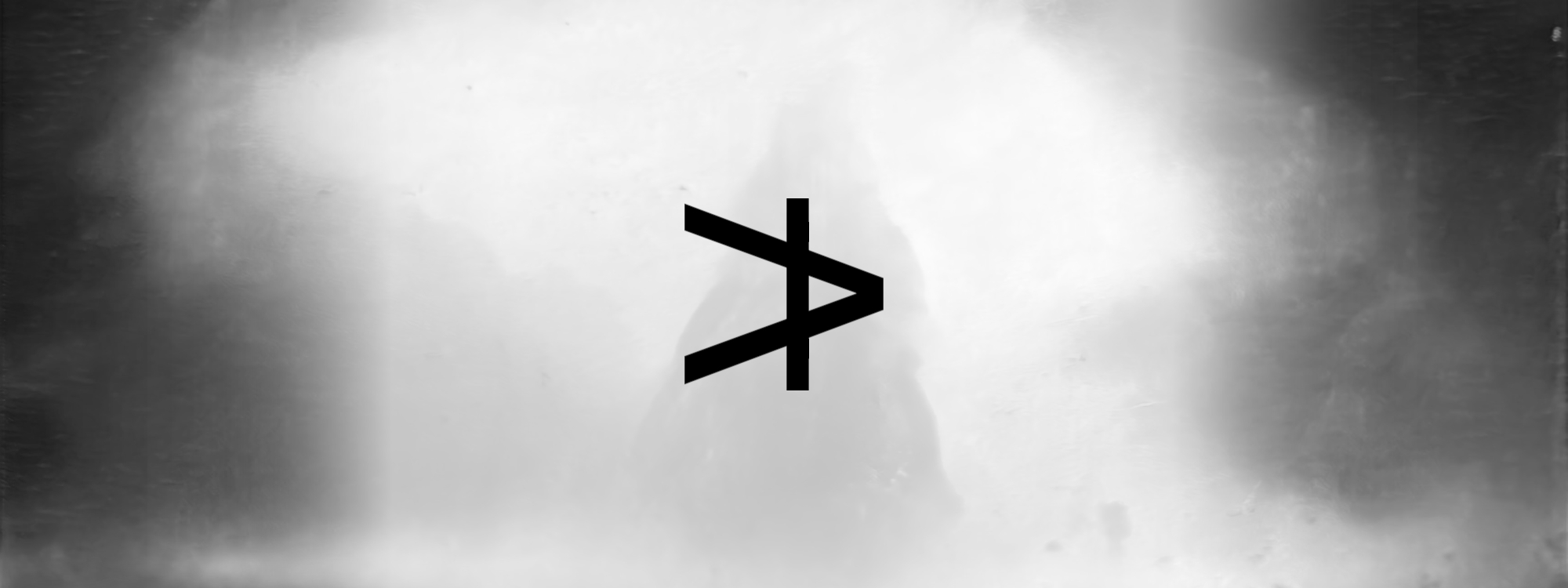




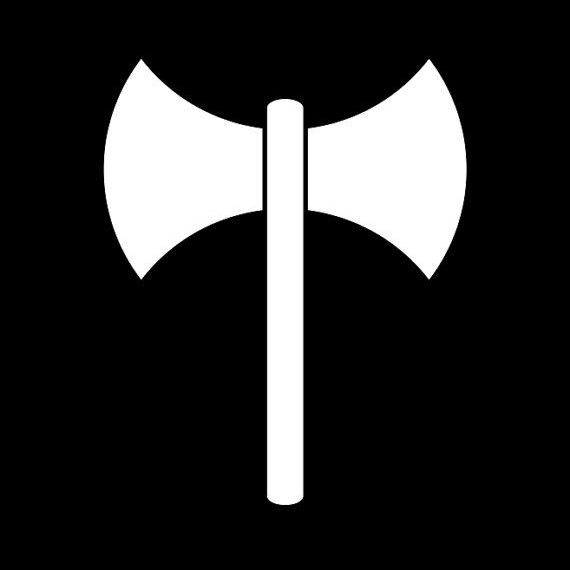


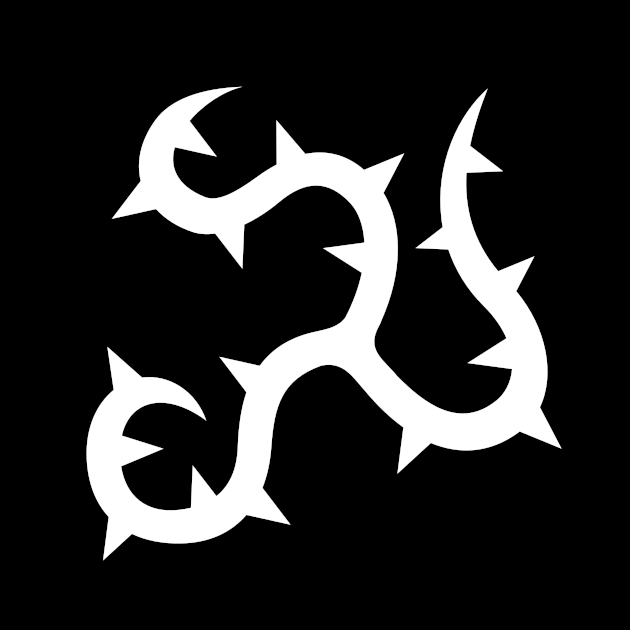
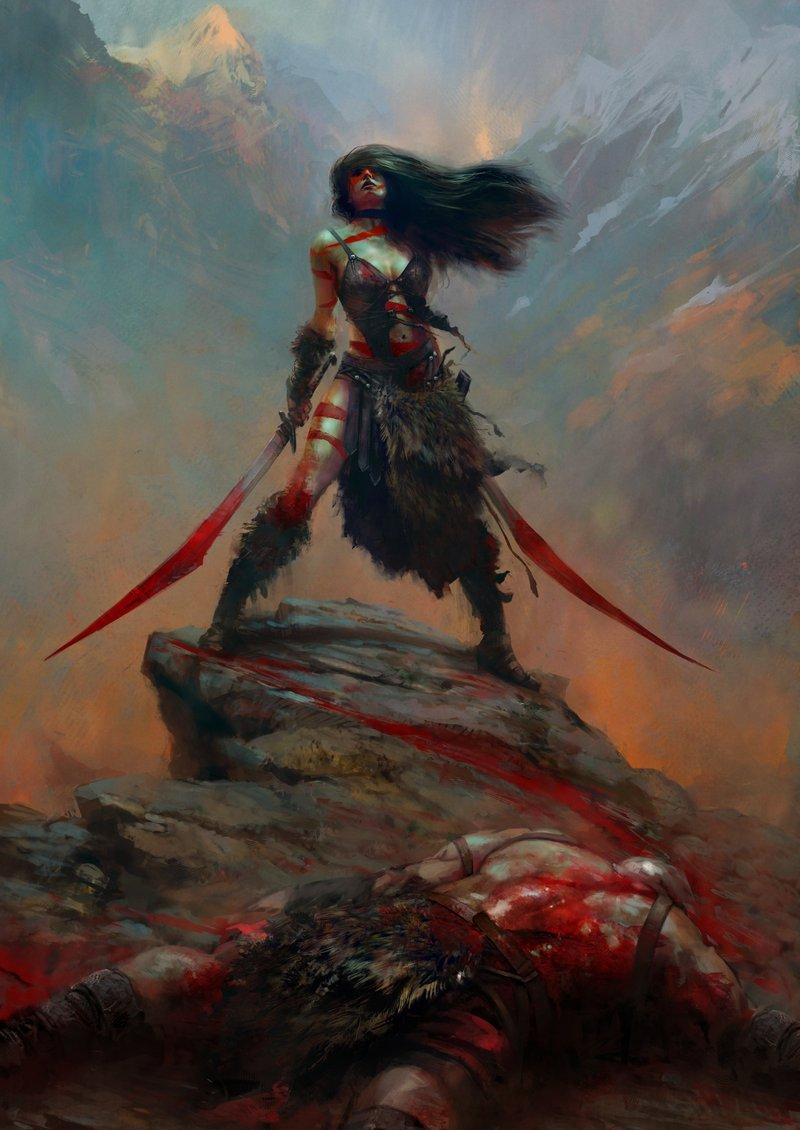
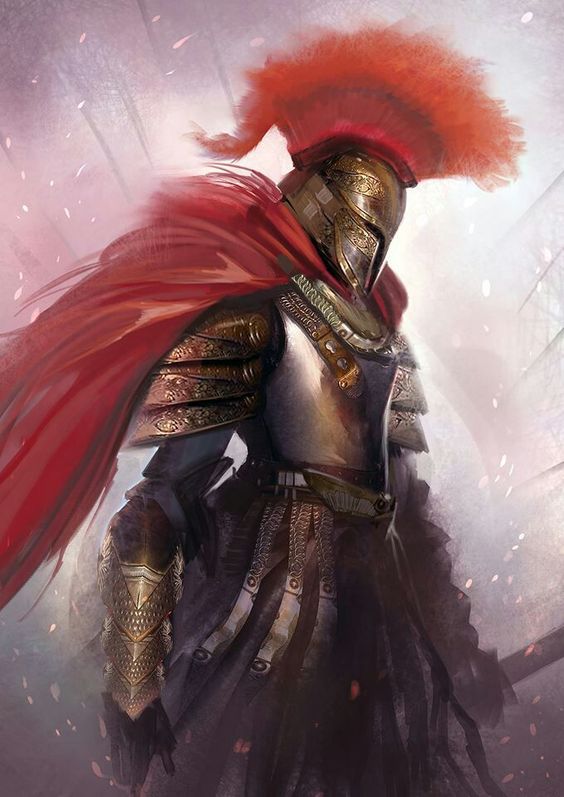



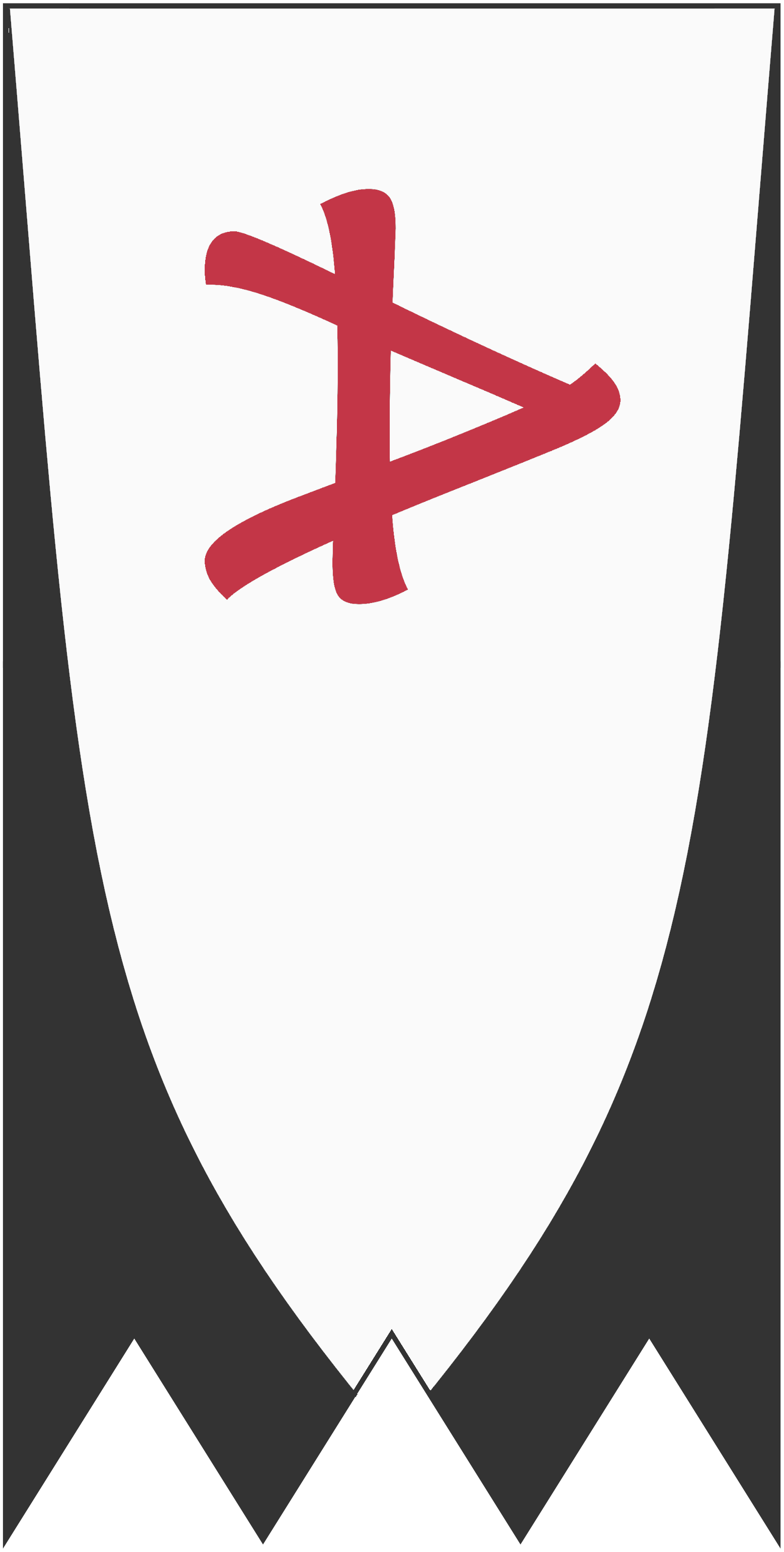
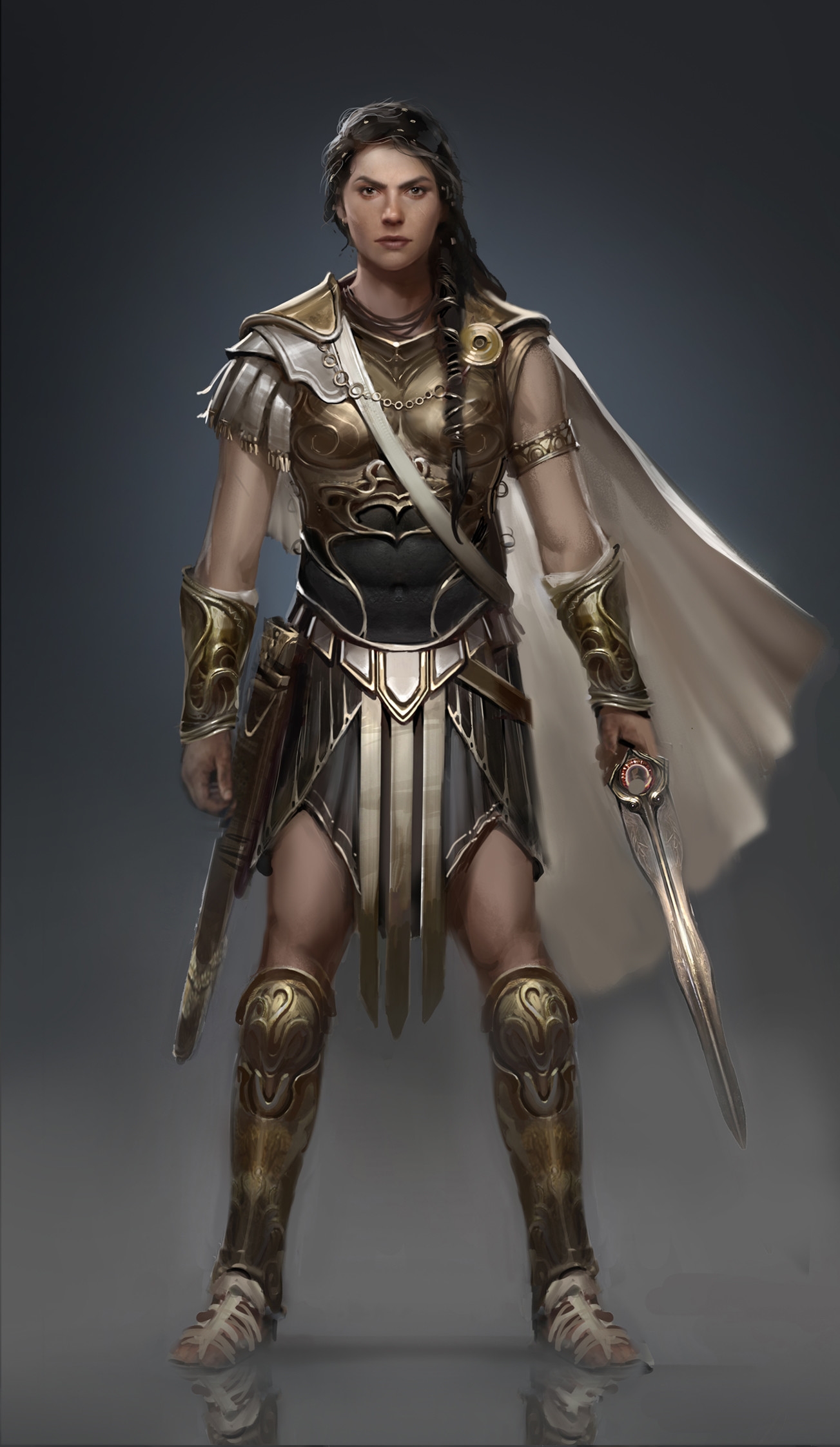
Comments
Author's Notes
I've always thought it odd that the "god of war" in any intellectual property is always somehow the best fighter in that entire setting. My interpretation of godly archetypes and divine domains doesn't really gel with that notion. "War" is not the same as "combat." Especially not total war. Surely there must be some other more specific domain that makes a god the greatest warrior. Much of the details in this article only took shape very recently. I was deeply inspired by the newest God of War on PC. It rekindled my love for spectacle fighters like Bayonetta, Devil May Cry, God of War, Dante's Inferno, Darksiders, Heavenly Sword, Hades, and so on. I've played a lot of those, and the thought occured to me that "What if all those games had the same protagonist? And what if her arsenal of weapons did not reset between games?" It was just plain old fun to mix, match, and invent my own version of a godly weapon cabinet.